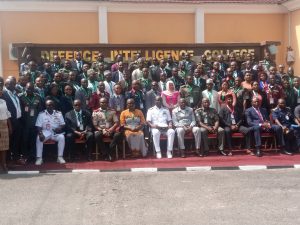
By Sumaila Ogbaje
The failure of intelligence gathering and sharing is the reason security agencies have not been able to address the current security challenges in Nigeria.
Maj.-Gen. Garba Wahab, the Director-General, Army Resource Centre (NARC), retired, said this at the opening of a four-day Leadership Course in Criminal and Security Intelligence Management Course 4/2022.
The News Agency of Nigeria (NAN) reports that the course was organised by the Defence Intelligence College (DIC), in conjunction with Peace Building Development Consult (PBDC) on Monday in Abuja.
The theme of the course is “Integrating Human and Artificial Intelligence in Combating Security Challenges in Nigeria”.
Wahab urged members of the intelligence community to identify how to address the security problems in the country, saying the failure of intelligence had magnified the problem.
According to him, there are questions about whether the security agencies actually act on intelligence provided by those in the field or whether those at the helm are actually working on what is being provided.
According to him, there is massive lack of trust and confidence, whether you want to call it revelry or whatever you want to call it.
“My prayer is that we don’t get to what happened to U.S in 2001 before we wake up because the same issues were raised so many times within be U.S. intelligence community.
“Agencies, services have information or intelligence credible enough but they were not passing, they were not sharing because everybody wants to lead.
“Unfortunately, the September 2001 incident took place and then all of a sudden everybody woke up and they realised that there were those who had information that these guys were actually trading in Canada and were moving in gradually.
“So we don’t have trust, we don’t have confidence in each other and that is the problem of leadership and even if you don’t have trust, you must be able to manage whatever you are doing and get the results,” he said.
Wahab, however, called for renewed and enhanced synergy among the various actors within the nation’s intelligence community and security agencies to be able to address the current security challenges.
He also urgedparticipants of the course to ensure they took away something that would help them to proffer solutions to the challenges.
Wahab also advocated involvement of members of the public in the security setup, saying they were the ones that usually see what happened around them.
The retired general said that citizens should be encouraged to provide information that would be analysed to become intelligence by the security agencies.
The Chief of Defence Intelligence (CDI), Maj.-Gen. Samuel Adebayo, said the intelligence college and its partners had trained more than 300 participants in the area of security and intelligence in the last four years.
Adebayo, who was represented by the Director of Operations, Defence Intelligence Agency (DIA), Maj.-Gen. Bala Isondu, said the training was needful given the myriad of security challenges which appeared to be mutating daily across the country.
He said the challenges had placed a heavy burden on the security stakeholders to deliver security to the citizens of Nigeria given the fact that security remained the primary responsibility of government.
Adebayo said that intelligence remained a potent instrument needed to stem the tide of criminality and insecurity in the country ranging from terrorism, banditry, insurgency, violent agitations, and kidnapping among others.
This, according to him, is very particular given the systematic and unconventional nature of threats in the 21st century.
“To provide an adequate response, security operations must be guided by intelligence for better operational results and good intelligence thrives on interagency cooperation.
“Thus, the need for intelligence sharing and shunning of rivalry is critical to Nigeria’s national security,” he said.
The CDI said the course was designed to encourage the exchange of competencies, experiences and ideas for the overall good of the intelligence community.
He urged participants to pay rapt attention to all the lectures, the questions and interactive sessions during the course with a view to acquiring transferable skills that would help improve the security architecture of the country.
The Commandant of DIC, Commodore Abraham Zipele, said the course had been of immense benefit to the intelligence and security community since its maiden edition in 2019.
Zipele said that security had remained a recurring challenge to the corporate existence of Nigeria as a nation in the last decade ranging from kidnapping, banditry piracy, and crude oil theft to insurgency and terrorism among others.
He said the threats posed by violent non state actors were becoming more dynamic, sophisticated, intelligence driven and well-choreographed to achieve their broad aims of destabilising the governments.
According to him, it is in realisation of this fact that short term courses of this nature are being periodically organized.
The aim he said was to provide the requisite knowledge and develop the capacity of members of the intelligence and security communities to overcome these security challenges.
The Course Director, Peace Building Development Consult, Mr Kayode Bolaji, said the course was put together to create a convivial environment for intelligence managers, security experts and stakeholders.
According to him, the objective is to assess the condition of intelligence gathering process and address the security challenges.
Bolaji said the participants were drawn from the intelligence community, the police, military, banks, private security agencies as well as Ministries, Departments and Agencies (MDAs). (NAN)



